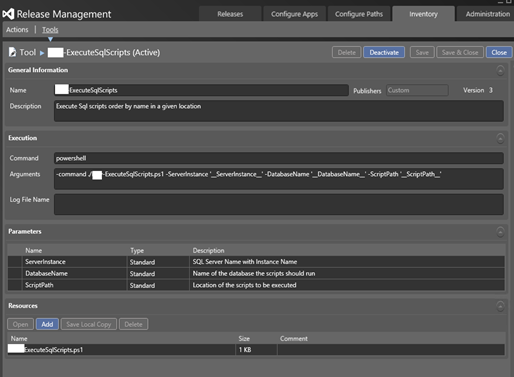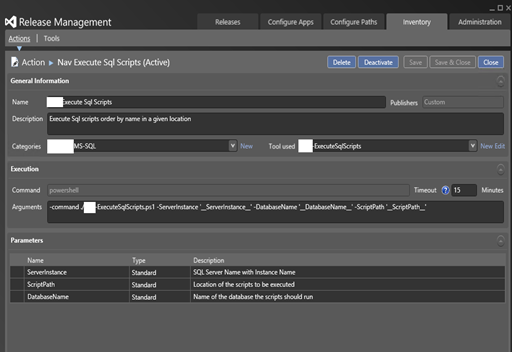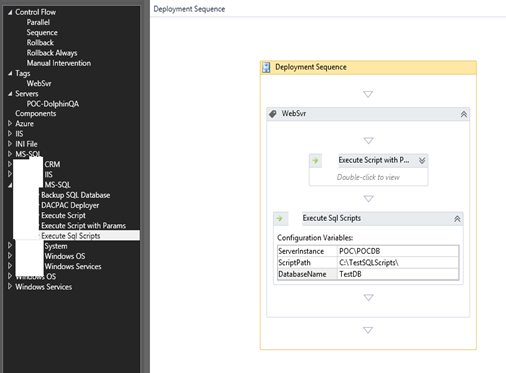Let’s see how we can do this step by step.
As the first step write a PowerShell script capable of executing batch of scripts in a transaction.
Param([string]$ServerInstance, [string]$DatabaseName, [string]$ScriptPath)
$ErrorOccured = $false
#Executing following snapins to Invoke-SqlCmd
Add-PSSnapin SqlServerCmdletSnapin100 -ErrorAction SilentlyContinue
Add-PSSnapin SqlServerProviderSnapin100 -ErrorAction SilentlyContinue
Write-Host "Executing patch scripts of path: $PatchScriptsPath"
Start-Transaction -RollbackPreference Error
Use-Transaction -TransactedScript {
foreach ($file in Get-ChildItem -path $ScriptPath -Filter "*.sql")
{
Write-Host Executing: $file.name ...
$ScriptPath = $ScriptPath + "\" + $file.name
Invoke-Sqlcmd -ServerInstance $ServerInstance -Database $DatabaseName -InputFile $ScriptPath -ErrorAction SilentlyContinue -ErrorVariable errors
foreach($error in $errors)
{
if ($error.Exception -ne $null)
{
$ErrorOccured = $true
Write-Host -ForegroundColor Red "Exception: $($error.Exception)"
}
}
}
} -UseTransaction
if ($ErrorOccured)
{
Undo-Transaction
throw "Error occured while Executing SQL Scripts."
}
else
{
Complete-Transaction
Write-Host Successfully executed all SQL scripts.
} Next create a tool in Release Management Client as shown below.

Parameters are
| Name | Type | Description |
| ServerInstance | Standard | SQL Server Name with Instance Name |
| DatabaseName | Standard | Name of the database the scripts should run |
| ScriptPath | Standard | Location of the scripts to be executed |
Create an action as shown below using the tool created above.

This action can be used in a release template as shown below to execute SQL scripts in a transaction.

On failure scripts actions will not be committed and release management action will fail. In Part 2, I will show this tool in action.




4 comments:
Good Post..
ScriptPath is not updated after executing first query.First query File name and second query file name is appended to ScriptPath before executing second query..resulting in Path not found Exception...
use this way
Write-Host Executing:$file.name ...
$Path = $ScriptPath
$FullPath =$Path+ "\"+$file.name
Invoke-Sqlcmd -ServerInstance $ServerInstance -Database $DatabaseName -InputFile $FullPath -ErrorAction SilentlyContinue -ErrorVariable errors
Being a DBA seems like it would be a lot of work. I am going to school to be a network admin, so I think I will end up doing a lot of database administration at times of my life. I don't know too much about SQL, but I still have a lot of time to learn. I think I have a class on it next semester. I will make sure to have everything backed up. It would be terrible to accidentally delete an entire database. http://www.datasparc.com
Thank you,
It's really a good post. I have some queries regarding the Scope of Release Management Tool.
1. How and Where can we better utilize RM for our Deployment Process ?
2. Is it Good for the Deployment of Normal Installers (.exe and .msi file extensions), so far I can only find tutorials for deploying Website ? I wants to use to deploy more than 20 Installers at once using RM.
3. Are there any ways to improve the Deployment and Configuration of the (.msi and .exe files) ?
4. Where can I find good tutorials for RM.
Thank you! This works for me after small change as below:
If you are getting Error: The term 'Invoke-Sqlcmd' is not recognized as the name of a cmdlet, function, s
cript file, or operable program.
Please add command as:
Import-Module "sqlps" -DisableNameChecking
This will solve your problem..
Post a Comment